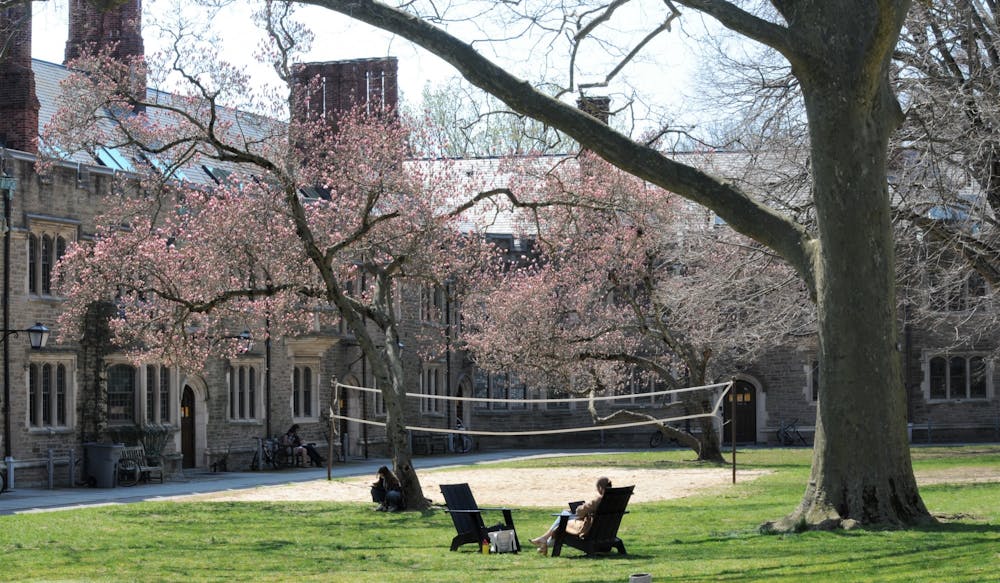The following is a guest contribution and reflects the author’s views alone. For information on how to submit an article to the Opinion Section, click here.
Over the course of my time at Princeton, I’ve found that community can be both fulfilling and draining. Among a crowd of stressed students, connections with others can often be a comfort. The University’s attempts to foster community through large-scale events like Lawnparties and smaller ones like residential college study breaks are appreciated. Yet engaging in student groups and community events, when following a busy day or week of academic work, often means we have less time to recharge and relax alone.
For many students, especially introverts and those of us with mental health challenges like anxiety, constantly engaging in the Princeton community can be especially draining. Throughout my own experience, I’ve found that due to my anxiety, I tend to spiral into self-doubt in group settings. This spiral, combined with my anxiety about illness (triggered by all the coughs in any and all communal spaces), makes constant social interaction a detriment to my mental health, rather than a benefit.
If the University is to make strides toward supporting students’ mental health, it must encourage and fund not only community events, but also resources for students to spend stress-free time alone.
Princeton’s mental health efforts should help all of its students, and that includes introverts, who make up around one-third of the population. In our stress-driven culture, it sometimes feels overwhelming to attend community events, or even to spend time with friends; coordinating schedules themselves can be stressful. Connection is crucial to our mental health, yes, but for those of us for whom connection is an additional stressor (and, I would wager, for us all), it is even more important to have the ability to fall back on, value, and trust oneself — to enjoy one’s own company.
Something different will work for everyone. For some, it’s finding a productive hobby, like learning an instrument or reading a book; for others, it’s rejecting frustrating and delusive notions of productivity and education and tuning out. For me, it’s the latter, in the form of comedy television. I can be feeling the worst about myself — job rejections are piling up, no one has texted me back, and I’m doubting my own skills and friendships — and then I put on “Ted Lasso” and proceed to laugh for half an hour.
I first discovered the crazy power of comedy television in the ninth grade (a time I was feeling constantly down) in the form of “30 Rock.” It became a daily habit, and I am so much happier because of it. It’s a cliché, but laughing even for a few minutes really is good for you. For myself, I know that half an hour of comedy television helps me recharge — it helps me gain perspective, get out of my limited and stress-crazed headspace, and brings a smile to my face. It helps me feel better about myself so I can then enter those University communities more confident and positive.
But not everyone can afford cable or a streaming service, let alone the plethora of streaming platforms among which favorite shows are divided. Many of us already have access to streaming services through our families, but it’s not equally easy for everyone to gain that access. Moreover, as mentioned, many of the shows we might want to watch are spread across platforms, increasing the monthly cost (for example, Netflix’s $15.49/month standard plan, plus Apple TV’s $6.99/month plan would come out to $22.48/month; add Amazon Prime’s student plan and Disney+, and you’re looking at $36.96).

And access to our families’ streaming services might be precarious: Netflix recently floated tightening password sharing rules, with the result that if students don’t visit home each month — most probably don’t — they won’t be able to use their family accounts.
So, why not pay for our streaming services (or cable)? Princeton has plenty of money — far more per student than NYU which, as I learned from my brother who generously let me watch HBO with him, provides cable and HBO Max for its students. If the University truly wants to help us improve our mental health, to help us connect with one another and with ourselves, it should invest in our alone time by granting us free access to streaming services. Because of my partiality to “Ted Lasso,” I’d put in my vote for Apple TV, and, because of “Veep,” HBO Max. But don’t just listen to me. See if anyone agrees — and if they do, run a poll to see which services students want. Provide access to as many platforms as possible.
Grace Rosenberg is a senior studying German. She can be reached at gr12@princeton.edu.









